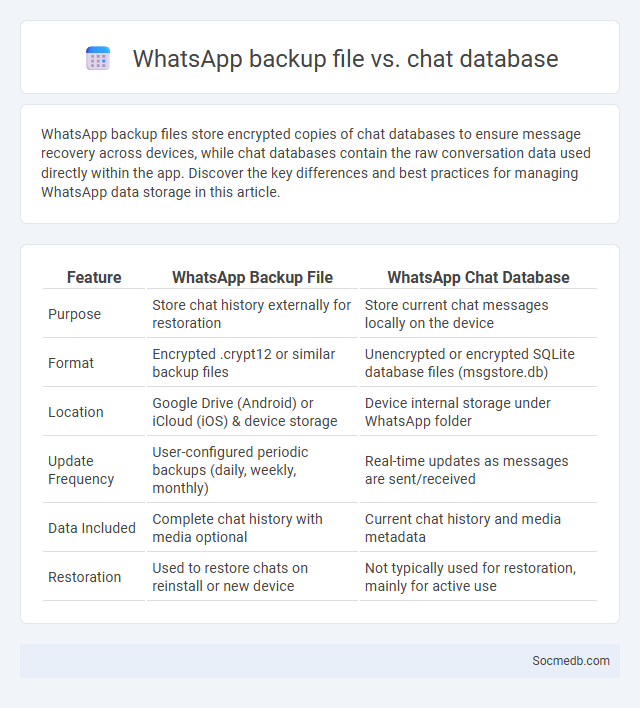
Photo illustration: WhatsApp backup file vs chat database
WhatsApp backup files store encrypted copies of chat databases to ensure message recovery across devices, while chat databases contain the raw conversation data used directly within the app. Discover the key differences and best practices for managing WhatsApp data storage in this article.
Table of Comparison
| Feature | WhatsApp Backup File | WhatsApp Chat Database |
|---|---|---|
| Purpose | Store chat history externally for restoration | Store current chat messages locally on the device |
| Format | Encrypted .crypt12 or similar backup files | Unencrypted or encrypted SQLite database files (msgstore.db) |
| Location | Google Drive (Android) or iCloud (iOS) & device storage | Device internal storage under WhatsApp folder |
| Update Frequency | User-configured periodic backups (daily, weekly, monthly) | Real-time updates as messages are sent/received |
| Data Included | Complete chat history with media optional | Current chat history and media metadata |
| Restoration | Used to restore chats on reinstall or new device | Not typically used for restoration, mainly for active use |
Introduction to WhatsApp Data Management
WhatsApp data management involves organizing, storing, and securing users' messages, media files, and metadata across devices and cloud services. Efficient data management ensures privacy compliance and seamless user experience by facilitating backup, retrieval, and synchronization processes. Understanding WhatsApp's end-to-end encryption and data retention policies is crucial for both individual users and enterprises handling sensitive communication.
Understanding WhatsApp Backup Files
WhatsApp backup files contain encrypted data of your chats, media, and settings, stored either locally on your device or in cloud services like Google Drive or iCloud. Understanding the file formats such as .crypt12 for Android or the iCloud backup system for iOS is crucial for restoring messages accurately. You can manage and transfer these backup files to ensure your chat history remains secure and accessible across devices.
What is the WhatsApp Chat Database?
The WhatsApp Chat Database is a structured file that stores all your message history, including texts, images, videos, and voice notes exchanged on the app. This database is usually saved locally in an encrypted format on your device and can be backed up to cloud services like Google Drive or iCloud for data recovery. Access to the WhatsApp Chat Database enables you to retrieve, manage, or transfer your conversations while maintaining privacy and security through end-to-end encryption.
Defining WhatsApp Chat Backup
WhatsApp Chat Backup securely stores your messages, photos, and videos on cloud platforms like Google Drive or iCloud, ensuring data recovery in case of device loss or app reinstall. It includes options for scheduled automatic backups and end-to-end encryption to protect your privacy. Your WhatsApp chat backup preserves conversation history, enhancing seamless communication continuity across devices.
Key Differences: Backup File vs Chat Database
A backup file on social media platforms stores a comprehensive snapshot of your entire account data, including posts, messages, photos, and settings, ensuring full recovery in case of loss or account issues. The chat database specifically archives your messaging history within the app, focusing solely on conversations for easy access and restoration without affecting other account components. Understanding these distinctions helps you manage and safeguard your social media content effectively.
Storage Locations for WhatsApp Data
WhatsApp data is primarily stored on users' local device storage, often in encrypted databases within the app's directory on both Android and iOS platforms. Backup options include Google Drive for Android devices and iCloud for iOS, allowing for cloud-based storage of chat histories, multimedia files, and settings. Proper management of these storage locations is critical for data security and efficient retrieval during device changes or restorations.
Data Encryption and Security Features
Data encryption ensures that your social media communications remain private and protected from unauthorized access by converting messages into secure codes. Robust security features like two-factor authentication and end-to-end encryption safeguard user accounts against hacking and data breaches. These technologies combine to create a safer social media environment, maintaining your privacy and the integrity of your personal information.
How to Restore from Backup File and Chat Database
Restoring from a social media backup file involves accessing the platform's settings to locate the import or restore option, then selecting the previously saved backup file, which typically contains account data and media. To recover the chat database, users must ensure the backup includes message histories, often saved in formats like JSON or SQLite, and upload these files through the designated chat recovery feature or application-specific backup tool. Following these steps accurately ensures the restoration of conversations, media, and account configurations to their previous state without data loss.
Common Issues with WhatsApp Data Backups
WhatsApp data backups frequently encounter issues such as incomplete restoration, corrupted files, and inconsistent syncing across devices. Problems often arise due to insufficient storage space, weak internet connections, or outdated app versions, which hinder successful backup creation and retrieval. Users experience challenges restoring chat histories and media, leading to potential data loss and disrupted communication continuity.
Choosing the Right Backup Method for Your Needs
Choosing the right backup method for your social media data ensures the security and accessibility of your content in case of account issues or platform changes. Cloud-based services offer automated backups and easy restoration, while local backups provide direct control over your files without relying on third-party platforms. Evaluate your storage capacity, frequency of posts, and the importance of data recovery speed to select the backup solution that best fits your social media management needs.
 socmedb.com
socmedb.com